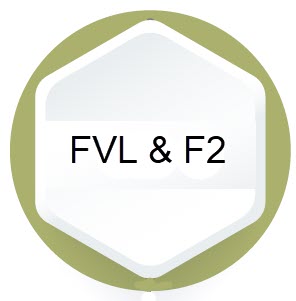FVL & F2 gene mutations

FVL & F2 genes are clotting genes, this means you may have a higher risk factor of having a clotting event or blood clot, which is obviously not a good thing to have because of the damage that a clot can do if it happens.
We rarely see homozygous (double bad copies) of FVL or F2 in our practice, this is because the gene can cause the death of a fetus (miscarriage), so they don’t get born or they die prematurely without having known about the problem.
FVL genes
The FVL gene is call “Factor V Leiden”. The problem with a bad FVL gene is activated protein C resistance, which can lead to hypercoagulability (an increased tendency of the blood to clot) characterized by a lack of response to activated protein C (APC), which normally occurs helps prevent blood from clotting excessively.
So, as you can imagine having a heterozygous (a half bad copy) FVL gene can be severe.
It’s important to note that FVL gene mutations can increase the risk of developing DVT (deep vein thrombosis) when on hormone replacement therapy and or using oral birth control medications.
F2 genes
The F2 gene is called “prothrombin”, just like FVL it is a clotting gene. The problem with an F2 gene is it provides instructions for making a protein called prothrombin (coagulation factor II).
This protein is proteolytically cleaved in multiple steps to form the activated serine protease thrombin. The activated thrombin enzyme plays an important role in thrombosis and hemostasis by converting fibrinogen to fibrin during blood clot formation, by stimulating platelet aggregation, and by activating additional coagulation factors. Thrombin also plays a role in cell proliferation, tissue repair, and angiogenesis as well as maintaining vascular integrity during development and postnatal life.
Through varied/altered instructions from F2 gene homeostasis of blood clotting can be varied leading to clotting.
It’s important to note that a F2 gene mutation can increase the risk of developing DVT (deep vein thrombosis) when on hormone replacement therapy and or using oral birth control medications.
Risk factors for FVL & F2 genes
The following factors can increase the risk of a clotting event with FVL & F2 gene mutations:
- Obesity
- Pregnancy
- Immobility (including prolonged activity, a long trip by plane or car
- Smoking
- Oral contraceptives
- Cancer
- Trauma
- Poor diet
- Elevated cholesterol
- Poor circulation
- Gene mutations in MTHFR, DHFR, MTR & MTRR
- Stroke (and family history of)
- Heart attack (and family history of)

